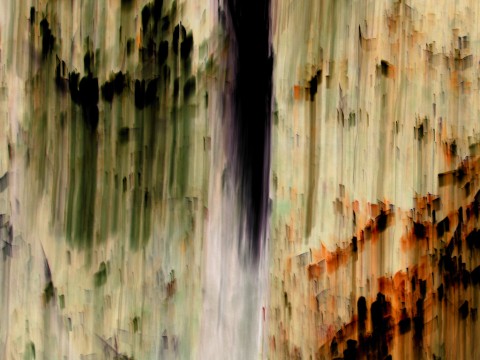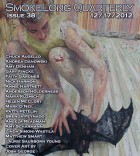I met my friend the cyclops for a drink at a downbeat cocktail bar with damp green walls and mismatched furniture. We went all sorts of places together. Today, he was buying. He’d recently come into some suspect fortune. He was playing tarot on the table nearest the aquarium. It was still light outside, though nearing 11 p.m. In summers in this country, we have extra hours for daylight, which we steal every year from the winter months, like hapless teenagers who think they know what’ll work, what’ll hide the stolen measure of booze this time.
So the cyclops is a boy, though a monstrous one, with his green eye very pretty and his slender hips. But his teeth are those of elephants. The Ancient Greeks found the skulls of elephants and mistook them for the skulls of giant men, one big eye where the trunk was missing from the wide white face. He tells me that elephant teeth are not the preserve of any creature. He tells me that he will never die, so long as he is a creature made from this confusion, and not any more complicated. Or he did tell me, once.
I slumped into a stool and kicked my shoes against the table spars.
“Hiya,” I said, in the irritating manner of my people. He smiled, shrugged. Sometimes he won’t speak for days. Immersed in the cards that day, he had many hobbies. Taunting the fates, reading factual books on World War Two, defacing public statuary with jaunty traffic cone hats.
The first time we ever met was in the Edinburgh Central Library, which perches on a bridge, its lower floors descending unseen into the Cowgate, rooting there in a valley of drunks and “spas” and old dripping and piss-dripped stone. It’s been a human enclosed valley for over eight hundred years, but the cyclops remembers back when it sheltered delicate fern as broad as a cowflank, and rare and sober yellmen in skins hunted the deer and sometimes mated with them, to good effect.
The librarians in the central library are aye bent bored over their desks, not being hunters nor being deer, and lacking cards to stamp since digitalisation. They carve their initials in the wood of their desks using their antlers. Their necks hang low and downy, and their collars are of the loosest type to accommodate them. I had never failed to note how this city had accrued such fauna, though only the cyclops ever caught me at it, sidling up on the edges of vision, with a grin.
“You’ve only one eye” I’d said, and him snickering away in happiness at that. Not even the librarians with their velvet ears heard him then, their soft-gloved hands turning the pages of Bibles, margins demarcated with something like their kind.
“Now, what’s my fortune?” I asked, snapping a corner of one card, “since you’ve had yours.” His wallet lolling there on the table, full of our pink purple money with a murderous king on it.
“A drink, if you couldn’t guess,” he said. Usually, he said more extraordinary things. The world of mythological creatures in modern day is without magic but infinitely precise. He could tell me fanciful stuff about poor people who lived for centuries, begging, forgotten by death. He could walk vertically up the Salisbury Crags, to wait for me at the top, tapping his converses while I walked up the human way, by the path by the yellow gorse. He knew every part of the city, that which had gone in fire or torn down, and parts that were to be. And though he could not take me there, he pointed them out. Here in 1647 a woman planted a garden that could only be seen by children. Here in 800, a prince of the Anglo-Saxon settlers was killed by a boar set on him by a Pict, a painted man. Here in 400BC the cyclops gave away his virginity, but never would tell the name or the form of the creature. I didn’t press, though I didn’t always believe him. He looked too fragile not to have kept his virginity. I suspected his virginity, his untouchedness, kept him. Even myths will lie as they please. He could be coreless as a fig, if he liked.
“All right, I’ll get it.”
“No need,” he said, and got up with a flourish. Him with his chest of plasterboard, his big soft green eye, but with tension in countenance like the front of a Viking longship. Off he sailed to pillage the bar.
“I’m glad we skip the tourists here,” I said to no one in particular, to the lacy goldfish swaying to its inner music of boredom. When I turned around, the cyclops was ordering us tall plum brandys, knock-downers, dapper as you like. As you can be, wearing a small black hoodie with the cowl of it up over your curls.
But there, all in an unheimlich way, was his other eye, visible green as the first.
Everything had taken on civilised proportions, and nothing at all was worth a note. He walked back to me, and nothing at all was worth a note, but the burn on my lips of foreign summer fruit, and the strum of it down my throat, and this boy tilting cards, frowning primly, as if he’d never seen Death or The Fool before.



 The core workshop of SmokeLong Fitness is all in writing, so you can take part from anywhere at anytime. We are excited about creating a supportive, consistent and structured environment for flash writers to work on their craft in a community. We are thrilled and proud to say that our workshop participants have won, placed, or been listed in every major flash competition. Community works.
The core workshop of SmokeLong Fitness is all in writing, so you can take part from anywhere at anytime. We are excited about creating a supportive, consistent and structured environment for flash writers to work on their craft in a community. We are thrilled and proud to say that our workshop participants have won, placed, or been listed in every major flash competition. Community works.